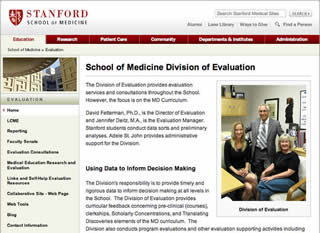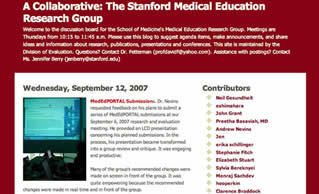Fetterman & Associates provide a wide-variety of evaluation consultation services in medicine. We provide services to individual hospitalsl, schools of medicine, health care agencies, and world-wide health-oriented organizations. A range of clients are presented below:
- Lehigh Valley Hospital, Family Practice Residency Program. Allentown, Pennsylvania.
- Lucille Packard Children's Hospital, Stanford, CA
- Stanford University Hospital, Stanford, CA
- UNICEF
ACCREDITATION
One of Fetterman & Associates areas of expertise involves guiding institutions through accredition, including preparing for site visits and actual formal review. Focal areas include:
- Pre-clinical courses - mid-course focus groups, classroom observation, individual interviews, end of course survey, post survey dialogue with faculty and curriculum committee.
- Clerkship -observation, interviews, and surveys.
- Scholarly Concentrations - portfolio development and implementation, individual interviews, surveys, and observations.
- Residency Director - interview and survey of graduates' performance.
- Mentor Program - interview, observe, and survey
Stanford University School of Medicine. Fetterman & Associates' president, Dr. Fetterman, was responsible for leading and facilitating the evaluation component of the School's accreditation team. Former Dean Phillip Pizzo and Associate Dean Julie Parsonnet authorized Dr. Fetterman to create and direct a division of evaluation in the School of Medicine at Stanford University. This represented the evaluative cornerstone of the accreditation preparation and review.
Fetterman & Associates created the office, developed a systematic data collection and analysis system, designed and built the office's web page, and continually reported evaluation findings to the Curriculum Committee and Faculty Senate. The data was also used to improve teaching, emphasizing more of a clinical focus, removing unintended redundancies, and making the material more engaging. A testiment to their efforts is that the School passed accreditation with "flying colors." A summary of how the empowerment evaluation approach was applied to the accreditation effort was published in Academic Medicine.
Fetterman, D.M., Dietz, J., and Gesundheit, N. (2010). Empowerment evaluation: A collaborative approach to evaluating and transforming a medical school curriculum. Academic Medicine, 85(5):813-820. The article is available online at the Academic Medicine site and upon request.
Fetterman & Associates' accreditation work has had an impact internationally. Their efforts to improve clerkships was reported in Ensaio, a Brazilian professsional journal.
Fetterman, D.M. (2009). Empowerment evaluation at the Stanford University School of Medicine: Using a critical friend to improve the clerkship experience. Ensaio: Avaliacao e Politicas Publicas em Educacao. Rio de Janeiro, 17(63):197-204.
Fetterman & Associates have also helped to guide accreditation efforts at other institutions including the California Institute of Integral Studies.
MEDICAL EDUCATION
Fetterman & Associates use evaluation to refine pre-clinical and clinical training. Teacher evaluations and mid-course student focus groups were developed and used to provide corrective feedback, allowing for mid-course corrections. Cumulatively the information was used to refine and improve the curriculum. Similarly, Fetterman & Associates also survey Residency Dierector's to solicit external assessments of the gradutes' performance. Their performance is a reflection of the school's curriculum. Residency Director feedback was instrumental in helping to further refine the schools curriculum.
Fetterman & Associates also helped stimulate medical education research. Dr. Fetterman directed Stanford's Medical Educaiton Research and Evaluation Group. He facilitatied medical education discussions based on pertinent articles, invited prominent guest speakers, helped colleagues prepare for professional association presentations, and provided a forum for colleagues to refine their medical education research and evaluation topics.
Dr. Fetterman's medical students conducted a national survey of medical school Dean around the country and identified a weakness in medical curriculum. The survey documented inadequate coverage of LGBT-related material in medical curriculum.. The results of their survey were reported in the Journal of the American Medical Association. The article received national attention, from ABC to CNN and a long list of related media outlets.
Obedin-Maliver, J., Goldsmith, E.S., Stewart, L., White, W., Tran, E., Brenman, S., Wells,M., Fetterman, D.M., Garcia, G., Lunn, M.R. (2011). Lesbian, Gay, Bisexual, and Transgender-Related Content in Undergraduate Medical Education. JAMA, 306(9):971-977. This article is having an impact on medical school curriculum throughout the United States.
Fetterman & Associates also present medical education presentations and conduct workshops throughout the United Stated and internationally, including the Association of American Medical Colleges.
TESTIMONIALS
Fetterman & Associate's Contributions to Medical Education
ADVISING DEAN (Stanford University School of Medicine)
Dear David,
Your evaluation efforts have been a monumental contribution to our educating and guiding these wonderful young men and women who desire to be the best doctors they can be. So the very least I can say is many thanks for your very meaningful efforts on behalf of ourmedical students!!! Very much appreciated!!!
Professor Oscar Salvatierra
Advising Dean
School of MedicineCO-DIRECTOR
Dear David,
Kelly and I would like to thank you for sharing your passion for your work with the faculty attending our Clinical Teaching facilitator-training course in October. They were very interested in to hear your work in education and medical education. We are so gald you could join us and make a special contribution to their experience at Stanford.
With much gratitude,
Georgette, Stratos, Ph.D.
Co-Director, Stanford Faculty Development Center
Stanford University School of Medicine
CHIEF OF GENERAL SURGERYTo: Senior Associate Dean & Associate Dean:
Re: Dr. David Fetterman
I wanted to send you both a quick note to let you know how helpful David Fetterman and his group has been to me and the department of surgery. He has faciliated a departmental retreat to talk about improving the clerkship, traveled to our non-Stanford sites to help with faculty training, and has always provided me with cumulative feedback and ideas on how we can continue to improve the clerkship. It has been an invaluable resource to me to have access to. Daivd is always responsive to my requests and provides me with the data and input I need. I have found it helpful to discuss new ideas with him. I am glad that we have access to his service and expertise and look forward to continuing to work with him in the future.
Dr. Sherry Wren
Director of Clerkships
Associate Dean, Academic Affairs
Chair, Faculty Senate
Stanford University School of Medicine
Chief of General Surgery, Palo Alto Veterans Administration, Palo Alto
David,All of the Stanford sites want you to come and work directly with them to help improve their teaching. The difference you made at Kaiser and SCVMC were visible and clearly effective.
Sincerely,
Dr. Sherry Wren
Director of Clerkships
Associate Dean, Academic Affairs
Chair, Faculty Senate
Stanford University School of Medicine
Chief of General Surgery, Palo Alto Veterans Administration, Palo Alto
ENDOCRINOLOGISTDear David,
Please excuse the hyperbole, but I am truly overcome by your response to my e-mail. I have been at Stanford for a long time, and cannot think of any time in the past when I have been the recipient of such thoughtful and effective administrative action. You understood the situation perfectly, and engineered a great solution to what in the large picture is a trivial issue. Thank you so much.
With great respect.
Professor Emeritus Jerry Reaven
Endocrinologist
School of Medicine
DIRECTOR OF CLERKSHIPS"David has made several site visits to assist clerkship directors in revising their orientations, syllabi, and student performance evaluations. End-of-clerkship evaluations demonstrate improved ratings as a result of feedback and coaching; narrative performance evaluations have improved in terms of completeness and level of detail."

